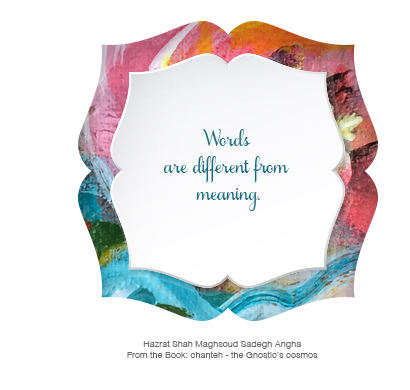The Tradition, The Way,
The truth
(Shari’at, Tarighat, Haghighat)
Sufis have spoken of the threefold meaning of Sufism according to:
the shari’at, the Muslim law,
the tarighat, the mystical path,
and the haghighat, the Truth.
It is purification on different levels: first from the lower qualities and the turpitude of the soul, then from the bondage of human qualities, and eventually a purification and election on the level of attributes.1
Hazrat Jalaleddin Ali Mir Abolfazl Angha, in referring to a saying by Sheikh Najmeddin Kobra has said: "Sufism consists of three stages: shari’at (tradition), tarighat (path of the heart), and haghighat (state of the heart). Shari’at is like the ship, tarighat like the sea, and haghighat like the treasure; therefore, whosoever desires the treasure must embark, sail the sea, and reach the treasure." He further states: "Purification in shari’at is in water and in tarighat in purifying the self from desires; and salat in tarighat is in separation from attachments and absolute awareness of the most gracious, in absorption in the ecstasy of union in prayer, regardless of time and place."2
On the meaning of shari’at and haghighat it has been said that shari’at is worshipping God, and haghighat is witnessing God. The Lord of the believers, Hazrat Ali (peace be upon him) has said: "Faith is manifested in the heart as a ray of light, and as faith increases, the light spreads." The ray of light is the source of life in the heart; it is man’s reality and the fountain of eternal knowledge.3
The word salat (prayer) literally means "call" and to perform it is to seek closeness to God. Salat (prayer) encompasses all three conditions as Amir-al-Mo’menin Ali (peace be upon him) has said, "Shari’at is servitude to Him with certainty; tarighat is presence in Him with certainty; and haghighat is witnessing Him with certainty." Imam Ja’far Sadegh (peace be upon him) has said that salat (prayer) encompasses these threefold meanings: Servitude is shari'at, Closeness is tarighat, and Union is haghighat. Indeed, all actions have these threefold meanings. For instance, fasting in shari’at is abstention from food and drink, and fasting in tarighat is abstention from the illusions of the mind and complete devotion to the love of the Lord. Pilgrimage in shari’at is visiting the House of Allah, in tarighat it is witnessing the Presence of Allah, and in haghighat pilgrimage is absolute annihilation in Allah.4
When the salek (seeker of the truth) has fully adhered to the aforementioned, he shall have reached his rank at the summit of devotion and servitude, his words and actions shall be strengthened by the Divine Light, and he shall be blessed. As the Almighty has promised, "God is the protector of those who have faith; from the depths of darkness He will lead them forth into Light" (Holy Qur’an, 2:257). In his state of purity, the streams of knowledge shall flow from his heart to his lips, and he shall see what eye has not seen, nor ear heard, nor the heart of any human being witnessed and he shall know ever clearly the reality of the manifestation of attributes.5
Hazrat Shahmaghsoud Sadegh Angha states: "Whatever has been revealed unto my heart, I have so drawn on paper, and may it purify your heart to read the mystery of God. But I have other words to say and other joys to reveal, but to hear it requires a different way of hearing and awareness. The servant must be firm in commitment, from God is guidance and enlightenment, and from God only we seek blessing, guidance, and refuge."6
